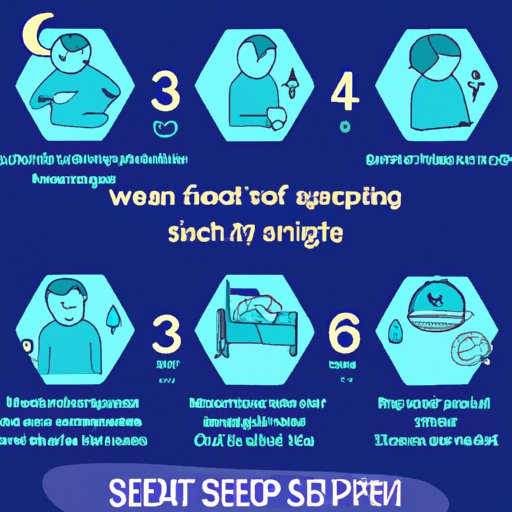Introduction
Sleep is essential for maintaining physical and mental health. Despite this, many people are cutting back on sleep, opting to get by with significantly fewer hours than the recommended 8. But is sleeping 6 hours enough? In this article, we’ll explore the benefits and risks of sleeping only 6 hours a night, examine the impact of sleep deprivation on health outcomes, investigate how to maximize quality sleep in limited amounts of time, and review scientific research on the adequacy of 6 hours of sleep.
Exploring the Benefits and Risks of Sleeping Only 6 Hours a Night
Sleeping 6 hours a night can be beneficial for certain individuals. For instance, it could be beneficial for those who have difficulty falling asleep or staying asleep. It could also be beneficial for those who have an unpredictable schedule or need to wake up early for work or school. Additionally, some people find that they perform better when they get less sleep.
However, there are some potential risks associated with sleeping only 6 hours a night. Firstly, there is the risk of sleep deprivation, which can lead to a variety of physical and mental health problems. Secondly, there is the risk of disrupting the body’s natural circadian rhythm, which can lead to further health issues. Thirdly, there is the risk of developing bad sleeping habits that can become difficult to break. Finally, there is the risk of increased stress levels due to lack of sleep.

Examining the Impact of Sleep Deprivation on Health Outcomes
Sleep deprivation can have a significant impact on a person’s physical and mental health. On a physiological level, sleep deprivation can lead to a weakened immune system, increased inflammation, and a higher risk of chronic diseases such as heart disease and diabetes. It can also lead to weight gain, fatigue, and increased risk of accidents.
On a cognitive level, sleep deprivation can lead to impaired memory, reduced reaction time, decreased concentration, and difficulty making decisions. It can also lead to moodiness, irritability, and depression. In extreme cases, it can even lead to hallucinations and paranoia.
Analyzing the Long-Term Effects of Short Sleeping Habits
Over time, short sleeping habits can have a negative impact on one’s physical and mental health. On a physical level, consistently sleeping 6 hours or less can increase the risk of cardiovascular disease, stroke, and high blood pressure. It can also lead to obesity, diabetes, and other metabolic disorders.
On a mental level, consistently sleeping 6 hours or less can increase the risk of anxiety, depression, and other mental health issues. It can also lead to impaired cognition and memory, as well as increased stress levels.

Investigating How to Maximize Quality Sleep in Limited Time
Given the potential risks associated with sleeping only 6 hours a night, it is important to maximize the quality of sleep within that time frame. This can be accomplished by developing good bedtime routines, optimizing the sleep environment, and practicing relaxation techniques.
Good bedtime routines involve going to bed and waking up at the same time each day, engaging in calming activities before bed, and avoiding screens and caffeine close to bedtime. Optimizing the sleep environment involves ensuring the room is dark, quiet, and comfortable. Finally, relaxation techniques such as deep breathing, progressive muscle relaxation, and guided imagery can help to reduce stress and prepare the mind and body for sleep.
Reviewing Scientific Research on the Adequacy of 6 Hours of Sleep
A number of scientific studies have been conducted to assess the adequacy of 6 hours of sleep. These studies have generally found that while 6 hours of sleep is not ideal, it is sufficient for most adults. However, it is important to note that individual needs vary, and some may require more or less sleep in order to function optimally.
These studies have also found that while 6 hours of sleep is adequate, it is still important to prioritize quality sleep. This means getting enough deep sleep, avoiding disruptions throughout the night, and ensuring the environment is conducive to restful sleep.

Debunking Myths About Sleeping Less Than the Recommended 8 Hours
There are a number of common misconceptions about sleeping less than the recommended 8 hours. For instance, some people believe that they can “catch up” on sleep by sleeping longer on weekends. Others believe that they can make up for lost sleep with naps during the day. Unfortunately, these beliefs are not supported by scientific evidence.
It is important to reassess what we know about sleep and its effect on the body. While sleeping 6 hours a night may be sufficient for some individuals, it is not ideal for everyone. It is important to prioritize quality sleep, and to be aware of the potential risks associated with sleep deprivation.
Conclusion
In conclusion, sleeping 6 hours a night can be beneficial for some individuals, but it is important to be aware of the potential risks associated with sleep deprivation. Additionally, it is important to prioritize quality sleep, and to develop good bedtime routines and optimize the sleep environment in order to maximize the quality of sleep in limited time. Finally, scientific research has generally concluded that 6 hours of sleep is adequate for most adults, but individual needs vary.
By understanding the benefits and risks of sleeping 6 hours a night, and by recognizing the importance of quality sleep, we can ensure that we are getting the rest we need to stay healthy and productive.


